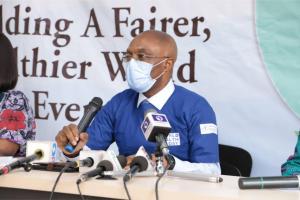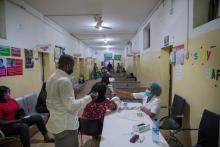WHO supports Government to monitor health inequities amidst COVID-19 response
Abuja, April 14, 2021 - “During this COVID-19 pandemic, I had serious challenges getting access to health care, especially my daily medication. Due to the lockdown, moving around was difficult as well as getting to the hospital.
I also remember missing my medication for two days because of the constraints in accessing healthcare”, says Asabe Audu a 35-year-old female, HIV positive civil servant that resides in Federal Capital Territory (FCT), Abuja.
She also had first-hand experience of inaccessibility to medical attention due to the pandemic. “I go to a private clinic. At some point, I could not see a doctor at all, the nurses t us the doctors have gone to isolation centers or are doing some COVID-19 related engagements”.
Another lady Christine Agbo, a diabetic patient who also reside in Abuja said she missed some of her medical routine during the pandemic.
“I missed my routine blood sugar testing during the pandemic as I was not able to go to work, I couldn’t make money to afford the tests”.
The COVID-19 pandemic disrupted a lot of health services across the world, including Nigeria where a lot of people like Asabe and Christine had their medical routines distorted.
“To improve this situation, we need to act on the social and economic determinants of health, by working across sectors to improve living and working conditions, and access to education, particularly for the most marginalized groups. Communities need to be engaged as partners, through their networks and associations, to shape and drive health and development interventions” stated Dr Walter Kazadi Mulombo, WHO Nigeria Country Representative.
WHO Nigeria is supporting the Government to monitor health inequities, and to ensure Universal Health Coverage (UHC)is attained by 2030.
A WHO report indicates that over 73% of the population make out-of-pocket payments for health services and only 6 800 000 have access to healthcare services which is not up to 10 percent of the entire population. The discussions to review the National Health Insurance act to make it mandatory for enrollment of all persons is critical input in addressing this gap.
WHO Nigeria is supporting government to strengthen capacities for the use of disaggregated data, based on socio-economic stratification of the population, to drive evidence-based decisions for priority areas for health and health related interventions. In addition, WHO is providing technical support for the policies and strategies that would ensure that a lot more people have financial access to quality health services.
Catalytic interventions such as the Integrated Medical Outreach, distribution of Long-Lasting Insecticide mosquito nets, outbreak response to vaccine preventable disease, revitalizing primary health care and improving quality of maternal and child health services, are geared towards mitigating the inequities in health service delivery. This is also supported by commitments by the government to a more systemic wide approach to addressing challenges with human resources needs, information management and use and sustainable financing as well as quality of service delivery in the health system.
Technical Contact:
Dr Boateng Koffi; Email: boatengko [at] who.int (boatengko[at]who[dot]int); Tel: +234 706 449 1772




